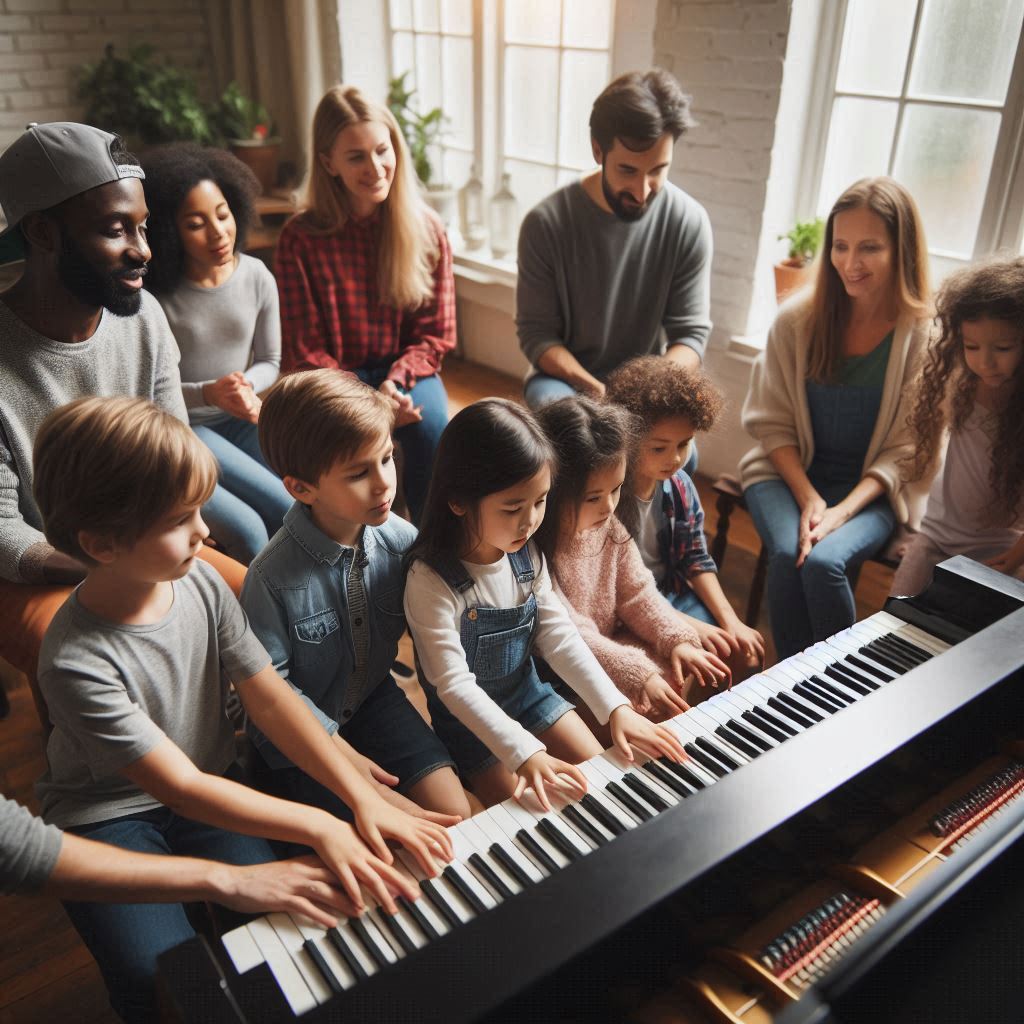Introduction
Group piano lessons offer a unique and engaging approach to learning the piano. Unlike traditional one-on-one lessons, group classes provide a collaborative environment where students can learn from each other, share experiences, and develop their musical skills collectively. This guide explores the numerous benefits of group piano lessons and why they might be the perfect choice for aspiring pianists.
The Benefits of Group Piano Lessons
Social Interaction and Peer Learning
Collaborative Environment
Group lessons create a collaborative environment where students can interact, share ideas, and learn from each other. This interaction fosters a sense of community and support, making the learning process more enjoyable and less isolating.
Peer Feedback
Receiving feedback from peers can provide different perspectives and insights. Constructive criticism from fellow students can help identify areas for improvement and reinforce learning.
Enhanced Motivation and Accountability
Healthy Competition
A little healthy competition can be highly motivating. Seeing peers progress can inspire students to practice more diligently and strive for excellence.
Shared Goals
Group lessons often involve shared goals and group activities, such as ensemble playing or group performances. These shared objectives can boost motivation and encourage regular practice.
Cost-Effective Learning
Affordable Option
Group piano lessons are typically more affordable than private lessons. The cost is shared among the students, making high-quality piano education accessible to more people.
Value for Money
Despite being more affordable, group lessons can offer great value. Students benefit from the collective learning experience and the opportunity to play in an ensemble setting, which is often not available in private lessons.
Development of Ensemble Skills
Playing Together
Group lessons provide opportunities for ensemble playing, where students play together as a group. This experience is invaluable for developing timing, listening skills, and the ability to play in harmony with others.
Coordination and Timing
Playing in a group requires precise coordination and timing. These skills are essential for any musician and are honed naturally in a group lesson setting.
Increased Fun and Engagement
Interactive Activities
Group lessons often include interactive activities and games that make learning fun. These activities can reinforce musical concepts in an engaging way, keeping students interested and motivated.
Social Enjoyment
Learning with others can make piano lessons more enjoyable. The social aspect of group lessons can turn practice and learning into a fun and eagerly anticipated activity.
Exposure to Different Learning Styles
Diverse Approaches
In a group setting, students are exposed to different learning styles and techniques. This diversity can provide a richer learning experience and help students discover new methods that work best for them.
Adaptability
Adapting to different teaching styles and learning methods can enhance a student’s overall adaptability and problem-solving skills, making them more versatile musicians.
Performance Opportunities
Regular Performances
Group lessons often include regular performance opportunities, such as recitals or informal performances during class. These experiences can help students build confidence and stage presence.
Overcoming Stage Fright
Performing regularly in front of peers can help students overcome stage fright and develop a more relaxed and confident attitude towards public performances.
Supportive Learning Environment
Encouragement and Support
Group lessons create a supportive environment where students encourage each other. This positive reinforcement can boost confidence and help students overcome challenges.
Sense of Belonging
Being part of a group can foster a sense of belonging and community. This feeling of connection can enhance the overall learning experience and keep students engaged.
FAQs
Are group piano lessons suitable for all ages? Yes, group piano lessons can be suitable for all ages, from young children to adults. The key is to find a group that matches the student’s age and skill level.
Do group piano lessons cater to individual learning needs? While group lessons focus on collective learning, many teachers incorporate individual attention into the class. Teachers often provide personalized feedback and guidance within the group setting.
How many students are typically in a group piano lesson? Group sizes can vary, but they usually range from 3 to 6 students. Smaller groups allow for more individual attention, while larger groups can offer a more diverse learning experience.
Can beginners join group piano lessons? Absolutely! Group piano lessons are a great way for beginners to start learning. The social and supportive environment can make the learning process less intimidating and more enjoyable.
What should I look for in a group piano lesson program? Look for programs that offer a structured curriculum, experienced teachers, and opportunities for performance and ensemble playing. It’s also important to find a group that matches your skill level and learning style.
How do group piano lessons compare to private lessons? Group piano lessons offer a collaborative and social learning experience, often at a lower cost. Private lessons, on the other hand, provide one-on-one attention and a more personalized approach. Both have unique benefits, and the best choice depends on the student’s preferences and learning goals.
Conclusion
Group piano lessons offer numerous benefits, from enhanced social interaction and motivation to the development of ensemble skills and increased enjoyment. The collaborative environment fosters a supportive and engaging learning experience, making piano education accessible and fun for students of all ages. Whether you’re a beginner or looking to enhance your musical skills, group piano lessons can be an excellent choice for your musical journey.



